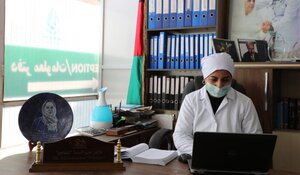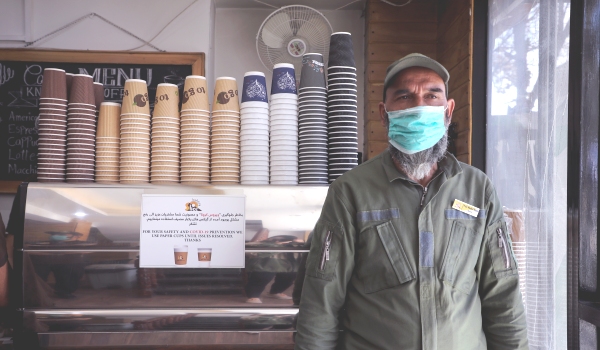Though the nation’s health system has long struggled to keep pace with the growing population — three doctors for every 10,000 people — the coronavirus is testing the limits of understaffed, underfunded and undersupplied hospitals and clinics around the country. Doctors at Kabul’s Stomatology hospital, which deals specifically with treatment of illnesses of the mouth, said their staff of 100 had run out of face shields, and had resorted to making their own using office supplies. At the Isteqlal Hospital in the West of the city, doctors said they had at least one patient they suspected of being COVID positive, but had no way of testing him to be sure. Even more troubling is the fact that there are only 300 ventilators, machines that move breathable air in and out of the lungs for patients who are unable to breathe normally on their own, in the country. In late April, the presidential palace approved the purchase of 500 additional ventilators, however, with the number of confirmed cases growing by the day, there are fears that even that may not be enough.
Add to this, an unemployment rate hovering between 30 and 40 percent, an ongoing political crisis wherein the top two finishers declared themselves victorious in last year’s presidential polls and a shaky peace agreement between Washington and the Taliban, and it becomes clear that the coronavirus has come at one of the most tumultuous times in a nation that has already dealt with more than 40 years of unrest and instability. The long-standing political tensions between President Ashraf Ghani and his former Chief Executive, Abdullah Abdullah, date back to the 2014 ballot, when Abdullah accused Ghani of widescale, government-assisted fraud. Those allegations led to a months-long fallout, a UN-assisted audit of all the votes cast in the runoff between the two men and finally, a political settlement brokered by then US Secretary of State, John Kerry, that saw Abdullah given the newly-created role of Chief Executive. For months, foreign donors, including the United States, have reprimanded both parties and insisted they come to a settlement so they can focus on the long-delayed talks between the Taliban and Afghan government.
Lockdown troubles

The government has tried to address the issue, namely with a lockdown of major cities that has stretched out to more than six weeks, but it has done little to curb the growth rate. When the lockdowns began in late March, there were approximately 79 COVID-19 cases, mostly centred in the Western province of Herat, today, there are more than 6.053 cases. By the time the first lockdowns were announced in the cities of Herat, Farah and Zaranj (provincial capital of Nimroz) — all of which are near the border with Iran — residents said it was already too late. In fact, the lockdowns came a full month after the first confirmed cases of COVID-19 were announced.
At the time of the initial lockdowns, the disease was mostly limited to the provinces bordering Iran, which was experiencing one COVID-related death every 10 minutes, but residents in those provinces said the lockdowns did not come soon enough. Initially, health officials insisted that the illness was a foreign import, mainly from those Afghans that had lived or worked in Iran. Residents in the city of Herat said Kabul’s failure to heed the advice of the Ministry of Public Health and immediately lockdown the city (along with Farah and Zaranj), made it possible for the disease to spread throughout the country. Since January, there have been more than 271,000 total returns from Iran, which has placed a particular strain on the three border crossing in the West of the country.Phrases like “They’re not all from Herat” and “They’ve already reached their home provinces,” were commonly heard from frustrated Heratis, who felt the government did not act quick enough. Making matters worse is the fact that there are only 10 ventilators in the entire province of Herat.
Kabul reported its first COVID cases four days prior to the shutdown of Herat, Farah and Zaranj. By May, Kabul surpassed Herat as Afghanistan’s hub for coronavirus cases. Though the nation-wide lockdown is approaching its second month, officials in the nation’s urban centres have been unable to enforce the quarantines and social distancing guidelines. Adding to the nation’s worry is that even the Ramadan holiday — which traditionally sees fewer people venturing out during the daylight hours — has done little to keep people at home.
Defying the lockdowns

Since the April 24 start of Ramadan, residents in Kabul and Herat have reported greater numbers of people and vehicles on the streets. There have been similar reports from Jalalabad, the capital of Nangarhar province. This despite the fact that Nangarhar is home to at least 150 cases. The number of coronavirus cases in Nangarhar, Paktia and Kandahar, all of which are either on or near the Durand Line — the 2,493 kilometer expanse of land that Islamabad sees as a border but Kabul has yet to accept as a division between the two countries — has raised concerns about the influx of Afghans returning from across the line and Pakistan itself. Pakistan is currently home to 27,474 COVID-19 cases. It’s not just loose implementation or the impunity enjoyed by the wealthy and politically connected, that’s leading to increasingly busy streets, though. Millions of Afghans depend on daily wages to get by, and the lockdowns of stores, salons and barber shops, restaurants and cafes across the country has taken a devastating toll on their lives. In Herat, Jalalabad and Kabul, residents lamented the lockdowns as a devastating blow to an already distressed economy. At any other time, one could exchange their money, repair their shoes, find a porter to transport their goods, buy fruits, vegetables and kabob, catch a cab and get their haircut on the streets of the nation’s major cities. This has created a reciprocal system where millions of people are reliant on the informal, cash-based economy both for their livelihoods and for essential goods and services.
The government has so far failed to provide adequate assistance to these people, who must choose between staying home to protect themselves from the virus and putting food on their tables. Even when the government has stepped in to help, it has come under criticism. A nation-wide scheme to distribute 10 pieces of bread a day to hundreds of thousands of needy families has led to warnings from the Ministry of Public Health, which fears that a lack of proper social distancing practices will see bread bakeries become hubs for even greater coronavirus outbreaks. Aside from a failure to enforce social distancing guidelines, residents in Kabul said the distributions have led to fights and injuries from rushes on the bakeries themselves. With the inflation rate of food goods at more than 16 percent and at least two million children facing acute malnutrition, these bread distributions are an essential service to low-income workers who are facing difficulties feeding their families due to the lockdowns, however, they have also become yet another example of officials failing to properly insure public safety. There have been reports of crowding at bread bakeries, where dozens, even hundreds of people, are lining up at a time, with little to no adherence of social distancing protocols. Adding to the worries is a report that Police in the central province of Ghor shot at a group of 100 demonstrators who were protesting against the unequal distribution of COVID-related aid. According to the Afghanistan Independent Human Rights Commission, at least four people were killed by Police fire.
Attacks during a pandemic
Though the coronavirus headlines may have taken some attention from the war, which rages on despite a February peace deal between the Taliban and Washington, the Taliban and other armed groups have not let up on their attacks. In April, the Taliban said they would suspend fighting in areas under their control where the coronavirus has hit, however, the numbers do not seem to bare that out. At the end of March, just as the nation’s urban centres were in the midst of lockdowns, the group staged more than 300 attacks across, 40 of which were in Herat.
Even fighters claiming allegiance to the so-called ‘Islamic State’ carried out a brazen attack on the nation’s Sikh minority three days prior to the lockdown of Kabul. That incident, which targeted a gathering praying for protection from the illness, led to the deaths of 25 people. The Afghan National Security Forces and their foreign allies have also not suspended their fighting. In March, an airstrike carried out by US forces led to the deaths of at 14 civilians in the Northern province of Kunduz. All tolled, the coronavirus pandemic has amounted to a major test of the Afghan government’s ability to demonstrate that it is capable of implementing its policies and protecting its people from yet another deadly force. So far, it seems as if they have fallen short.

